See Page 1 |
2 | of the November 2024 homepage
archives. Friday the 29th
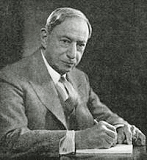 Mr. Hugo Gernsback died on August 19,
1967. At the time, he was the editor-in-chief of Radio-Electronics magazine,
the last in a very long line of electronics-themed magazines he founded and ran
for many decades. Beginning with Modern Electrics in 1906), he progressed
to Electrical Experimenter in 1912, then Radio Amateur News in
1919, and also Radio News in 1920, Radio Craft in 1929, Television
in 1929, Television News in 1932, and finally Radio-Electronics
in 1948. A shorter obit appeared in the previous month, no doubt due to a publishing
deadline with a rush job needing to suffice until a more extensive and fitting version
could be penned... Mr. Hugo Gernsback died on August 19,
1967. At the time, he was the editor-in-chief of Radio-Electronics magazine,
the last in a very long line of electronics-themed magazines he founded and ran
for many decades. Beginning with Modern Electrics in 1906), he progressed
to Electrical Experimenter in 1912, then Radio Amateur News in
1919, and also Radio News in 1920, Radio Craft in 1929, Television
in 1929, Television News in 1932, and finally Radio-Electronics
in 1948. A shorter obit appeared in the previous month, no doubt due to a publishing
deadline with a rush job needing to suffice until a more extensive and fitting version
could be penned...
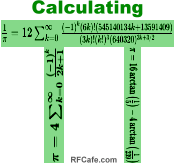 The concept
of π
as the
ratio of a circle's circumference to its diameter has been recognized since
antiquity. Early calculations of π were conducted using geometric and numerical
methods long before modern computing tools. Around 1900 BC, the Babylonians approximated
π
as 3.125, while the Egyptians, as evidenced by the Rhind Papyrus, calculated a value
of approximately 3.1605. The Greek mathematician Archimedes of Syracuse (287–212
BC) advanced these efforts by inscribing and circumscribing polygons around a circle,
calculating their perimeters to determine bounds for
π.
His approximation, which placed
π
between 3.1408 and 3.1429, was remarkably... The concept
of π
as the
ratio of a circle's circumference to its diameter has been recognized since
antiquity. Early calculations of π were conducted using geometric and numerical
methods long before modern computing tools. Around 1900 BC, the Babylonians approximated
π
as 3.125, while the Egyptians, as evidenced by the Rhind Papyrus, calculated a value
of approximately 3.1605. The Greek mathematician Archimedes of Syracuse (287–212
BC) advanced these efforts by inscribing and circumscribing polygons around a circle,
calculating their perimeters to determine bounds for
π.
His approximation, which placed
π
between 3.1408 and 3.1429, was remarkably...
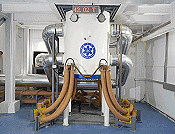 "On September 22, a resistive magnet in
China generated a steady
magnetic field of 42 tesla, setting a new world record for this type of magnet.
It is another major breakthrough by the High Magnetic Field Laboratory of Hefei
Institutes of Physical Science, Chinese Academy of Sciences (CHMFL), following its
success in the world's most powerful 45.22 tesla hybrid magnet in 2022. The new
magnet marks a new milestone in the development of resistive magnet technology.
After nearly four years of unremitting efforts, scientists and engineers innovated
the structure of the magnet, optimized its manufacturing process, and finally produced
a steady magnetic field..." "On September 22, a resistive magnet in
China generated a steady
magnetic field of 42 tesla, setting a new world record for this type of magnet.
It is another major breakthrough by the High Magnetic Field Laboratory of Hefei
Institutes of Physical Science, Chinese Academy of Sciences (CHMFL), following its
success in the world's most powerful 45.22 tesla hybrid magnet in 2022. The new
magnet marks a new milestone in the development of resistive magnet technology.
After nearly four years of unremitting efforts, scientists and engineers innovated
the structure of the magnet, optimized its manufacturing process, and finally produced
a steady magnetic field..."
 Sam Benzacar, of Anatech Electronics, an
RF and microwave filter company, has published his November 2024 newsletter that,
along with timely news items, features his short op-ed titled "6G
Is on the Horizon, But Don't Hold Your Breath." In it, he explains why even
though the term "6G" is being bandied about in the news these days, we are still
a long way off until its benefits begin to appear in actual hardware. Per Sam, "The
technology aims to achieve terabit-per-second data rates, microsecond latency, and
coverage that extends from the ocean floor to space. These capabilities would enable
applications far beyond what's possible with 5G, including holographic communications,
high-precision digital twins, and immersive extended... Sam Benzacar, of Anatech Electronics, an
RF and microwave filter company, has published his November 2024 newsletter that,
along with timely news items, features his short op-ed titled "6G
Is on the Horizon, But Don't Hold Your Breath." In it, he explains why even
though the term "6G" is being bandied about in the news these days, we are still
a long way off until its benefits begin to appear in actual hardware. Per Sam, "The
technology aims to achieve terabit-per-second data rates, microsecond latency, and
coverage that extends from the ocean floor to space. These capabilities would enable
applications far beyond what's possible with 5G, including holographic communications,
high-precision digital twins, and immersive extended...
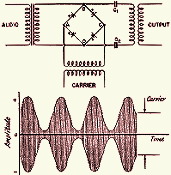 Byron Goodman published a very thorough
diode modulator
article in a 1953 issue of the American Radio Relay League's QST magazine. It was
one of the first of such articles that used the very recently available semiconductor
diodes rather than the previously used vacuum tubes. Single-balanced bridge and
ring modulator circuits are presented, along with the theory behind their operation.
It would be a few years more before double balanced mixers with their abilities
to reject even intermodulation products, and triple balanced mixers with very high
overall spurious product rejection, would become commonplace... Byron Goodman published a very thorough
diode modulator
article in a 1953 issue of the American Radio Relay League's QST magazine. It was
one of the first of such articles that used the very recently available semiconductor
diodes rather than the previously used vacuum tubes. Single-balanced bridge and
ring modulator circuits are presented, along with the theory behind their operation.
It would be a few years more before double balanced mixers with their abilities
to reject even intermodulation products, and triple balanced mixers with very high
overall spurious product rejection, would become commonplace...
• IEEE Ensures
Quality
in Engineering Education
•
EU Catalyzes Semi Future Through Research
•
$8B of $10B Capital Projects Fund Spent for Broadband
•
Radio at Center of Election Endgame
• FCC Releases
Internet Access 2023 Report
 Exodus Advanced Communications is a multinational
RF communication equipment and engineering service company serving both commercial
and government entities and their affiliates worldwide. Power amplifiers ranging
from 10 kHz to 51 GHz with various output power levels and noise figure
ranges, we fully support custom designs and manufacturing requirements for both
small and large volume levels. decades of combined experience in the RF field for
numerous applications including military jamming, communications, radar, EMI/EMC
and various commercial projects with all designing and manufacturing of our HPA,
MPA, and LNA products in-house. Exodus Advanced Communications is a multinational
RF communication equipment and engineering service company serving both commercial
and government entities and their affiliates worldwide. Power amplifiers ranging
from 10 kHz to 51 GHz with various output power levels and noise figure
ranges, we fully support custom designs and manufacturing requirements for both
small and large volume levels. decades of combined experience in the RF field for
numerous applications including military jamming, communications, radar, EMI/EMC
and various commercial projects with all designing and manufacturing of our HPA,
MPA, and LNA products in-house.
Thursday the 28th
 When I saw this first
electronics-themed comic in the May 1959 issue of Electronics World
magazine, my thought was how most people today probably cannot relate to the task
of installing and adjusting a rooftop antenna for televisions. Ditto for FM antennas.
Most people who still watch TV use cable, although some have satellite TV. Then
I thought about how Ham radio operators are the last vestige of civilians who rely
on antennas and over-the-air radio communications (other than the world's nearly
5 billion cellphone users who don't realize their phones are radios). Television
antenna design and installation was never a high-tech sport for typical homeowners
as it is for Amateurs; it was just a necessary nuisance. That one TV in the April
1960 comic looks like it could be my 1990s-era Packard Bell computer... When I saw this first
electronics-themed comic in the May 1959 issue of Electronics World
magazine, my thought was how most people today probably cannot relate to the task
of installing and adjusting a rooftop antenna for televisions. Ditto for FM antennas.
Most people who still watch TV use cable, although some have satellite TV. Then
I thought about how Ham radio operators are the last vestige of civilians who rely
on antennas and over-the-air radio communications (other than the world's nearly
5 billion cellphone users who don't realize their phones are radios). Television
antenna design and installation was never a high-tech sport for typical homeowners
as it is for Amateurs; it was just a necessary nuisance. That one TV in the April
1960 comic looks like it could be my 1990s-era Packard Bell computer...
 "India's Solid State Physics Laboratory (SSPL),
part of the efence Research and Development Organisation (DRDO), has developed indigenous
processes for manufacturing
4-inch silicon carbide (SiC) wafers and fabricating high-electron-mobility transistors
(HEMTs) based on gallium nitride (GaN). This innovative GaN-on-SiC technology supports
applications up to X-band frequencies, producing up to 150W in transistors and 40W
in monolithic microwave integrated circuits (MMICs). The GaN/SiC technology is poised
to revolutionize next-generation applications across defense, aerospace, and clean
energy..." "India's Solid State Physics Laboratory (SSPL),
part of the efence Research and Development Organisation (DRDO), has developed indigenous
processes for manufacturing
4-inch silicon carbide (SiC) wafers and fabricating high-electron-mobility transistors
(HEMTs) based on gallium nitride (GaN). This innovative GaN-on-SiC technology supports
applications up to X-band frequencies, producing up to 150W in transistors and 40W
in monolithic microwave integrated circuits (MMICs). The GaN/SiC technology is poised
to revolutionize next-generation applications across defense, aerospace, and clean
energy..."
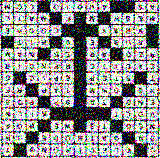 Cruciverbalists rejoice! Here is another
tech-related crossword puzzle to try your technical prowess. Unlike the weekly
RF Cafe crossword puzzle that contains only engineering, science, mathematics and
other tech words, this one from Electronics World magazine does have a
few unrelated words. The big difference between making crosswords then and now is
Mrs. Le Fevre had to construct the grid of words manually, whereas I just
create a huge file of words and definitions, draw the grid outline, and then click
a button to have software put it all together. I'm guessing it took a couple hours
to make this puzzle; mine take about 15 minutes (plus about about 20-30 minutes
to format and post on a webpage)... Cruciverbalists rejoice! Here is another
tech-related crossword puzzle to try your technical prowess. Unlike the weekly
RF Cafe crossword puzzle that contains only engineering, science, mathematics and
other tech words, this one from Electronics World magazine does have a
few unrelated words. The big difference between making crosswords then and now is
Mrs. Le Fevre had to construct the grid of words manually, whereas I just
create a huge file of words and definitions, draw the grid outline, and then click
a button to have software put it all together. I'm guessing it took a couple hours
to make this puzzle; mine take about 15 minutes (plus about about 20-30 minutes
to format and post on a webpage)...
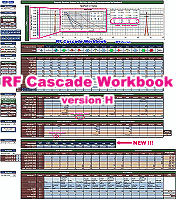 For two decades,
RF Cascade Workbook™ has been the de facto standard for spreadsheet-based RF
system cascade analysis. Chances are you have never used a spreadsheet quite like
this. Extensive use of VBA code enables complex calculations and automated user
interface features that make the experience more like a software program than a
spreadsheet. Using RF Cascade Workbook™ is as easy as any other Excel spreadsheet.
H, is not a major change, but does add a few convenience features. New in version H
is the ability to specify up to 10 discrete signals (frequency and amplitude) to
track their as they pass through the system. This includes both amplitude and frequency
as modified by amplifiers, filters, and mixers (frequency translation). They appear
on the "Signal Power vs. Frequency" chart along with the original plots. It is handy
for including discrete interference signals separate from the normal intended frequency
band. Discrete components can be inside or outside the operational bandwidth. Also,
Lock and Unlock buttons have been added to the System Definition worksheet to simplify
protection of formula cells against accidental overwriting. By popular demand, both
a 15-component and a 30-component version is included with your purchase. Same ridiculously
low price... For two decades,
RF Cascade Workbook™ has been the de facto standard for spreadsheet-based RF
system cascade analysis. Chances are you have never used a spreadsheet quite like
this. Extensive use of VBA code enables complex calculations and automated user
interface features that make the experience more like a software program than a
spreadsheet. Using RF Cascade Workbook™ is as easy as any other Excel spreadsheet.
H, is not a major change, but does add a few convenience features. New in version H
is the ability to specify up to 10 discrete signals (frequency and amplitude) to
track their as they pass through the system. This includes both amplitude and frequency
as modified by amplifiers, filters, and mixers (frequency translation). They appear
on the "Signal Power vs. Frequency" chart along with the original plots. It is handy
for including discrete interference signals separate from the normal intended frequency
band. Discrete components can be inside or outside the operational bandwidth. Also,
Lock and Unlock buttons have been added to the System Definition worksheet to simplify
protection of formula cells against accidental overwriting. By popular demand, both
a 15-component and a 30-component version is included with your purchase. Same ridiculously
low price...
Wednesday the 27th
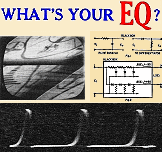 As I write this, it is the day before Thanksgiving.
While awaiting the 5:00 whistle to blow so you can go home for a four-day weekend,
take a shot at these three
circuit puzzlers from a 1962 issue of Radio-Electronics magazine. Due
to the published era, the first problem is probably unsolvable today by all but
two or three people on Earth. Jack Darr was the TV troubleshooter guy for the publication,
and his contributions were always the hardest to solve. The composite analog signal
format which comprised a standard color television signal was utterly amazing. Receiver
circuits which parsed and processed those signals were more amazing, particularly
given the opportunity between the broadcast antenna and the TV... As I write this, it is the day before Thanksgiving.
While awaiting the 5:00 whistle to blow so you can go home for a four-day weekend,
take a shot at these three
circuit puzzlers from a 1962 issue of Radio-Electronics magazine. Due
to the published era, the first problem is probably unsolvable today by all but
two or three people on Earth. Jack Darr was the TV troubleshooter guy for the publication,
and his contributions were always the hardest to solve. The composite analog signal
format which comprised a standard color television signal was utterly amazing. Receiver
circuits which parsed and processed those signals were more amazing, particularly
given the opportunity between the broadcast antenna and the TV...
 Anyone who watched the
WKRP in Cincinnati
TV sitcom back in the 1970s has to remember what was one of the funniest episodes
ever. Here is the 4 minutes that made Prime Time history. In this Thanksgiving episode,
station owner Arthur Carlson decided he would surprise the community with good deed
- that doubled as a promotional stunt for his radio station - by dropping turkeys
from a helicopter for lucky shoppers at the local shopping mall. Watch the disaster
unfold as Les Nessman reports live, and then see Carlson's final comment that is
still used or alluded to in many comic routines. Posting this video is an RF Cafe
tradition. Have a Happy Thanksgiving! Anyone who watched the
WKRP in Cincinnati
TV sitcom back in the 1970s has to remember what was one of the funniest episodes
ever. Here is the 4 minutes that made Prime Time history. In this Thanksgiving episode,
station owner Arthur Carlson decided he would surprise the community with good deed
- that doubled as a promotional stunt for his radio station - by dropping turkeys
from a helicopter for lucky shoppers at the local shopping mall. Watch the disaster
unfold as Les Nessman reports live, and then see Carlson's final comment that is
still used or alluded to in many comic routines. Posting this video is an RF Cafe
tradition. Have a Happy Thanksgiving!
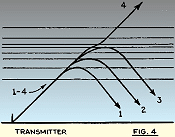 Prior to atmospheric sounding rockets and
orbiting satellites, all information gained and theories developed on the nature
of
Earth's upper atmosphere and its interaction with electromagnetic waves (shortwave
radio in particular) were purely academic, not the result of empirical data. That
is not to say the theories were wrong (although some were), just that they were
incomplete. For that matter, even today there is still much to be learned and, according
to an excellent article in the October 2015 issue of the ARRL's QST magazine
titled "Five Myths of Propagation Dispelled", there is still a lot of misinformation
being believed and promulgated about shortwaves and how they travel in the atmosphere.
This work... Prior to atmospheric sounding rockets and
orbiting satellites, all information gained and theories developed on the nature
of
Earth's upper atmosphere and its interaction with electromagnetic waves (shortwave
radio in particular) were purely academic, not the result of empirical data. That
is not to say the theories were wrong (although some were), just that they were
incomplete. For that matter, even today there is still much to be learned and, according
to an excellent article in the October 2015 issue of the ARRL's QST magazine
titled "Five Myths of Propagation Dispelled", there is still a lot of misinformation
being believed and promulgated about shortwaves and how they travel in the atmosphere.
This work...
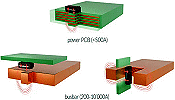 "Melexis has announced a
magnetism-based current sensor that needs no ferromagnetic core, for measuring
currents through power PCBs and bus bars. MLX91235 is gradiometric, taking a differential
magnetic field measurement with two internal sensing elements 'ensuring stray field
effects are eliminated,' according to the company. It is aimed at automotive and
other e-mobility applications and, as such, has been designed for functional safety.
'Going beyond ASIL B requirements, it also incorporates a built-in self-test feature
that encompasses the complete signal chain..." "Melexis has announced a
magnetism-based current sensor that needs no ferromagnetic core, for measuring
currents through power PCBs and bus bars. MLX91235 is gradiometric, taking a differential
magnetic field measurement with two internal sensing elements 'ensuring stray field
effects are eliminated,' according to the company. It is aimed at automotive and
other e-mobility applications and, as such, has been designed for functional safety.
'Going beyond ASIL B requirements, it also incorporates a built-in self-test feature
that encompasses the complete signal chain..."
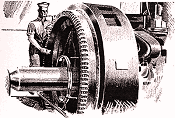 Scientists and technicians make a point
of specifically defining all the terms they use. They like their language to say
exactly what they mean. This is necessary because scientists use technical terms
in explaining their work. With a good working knowledge of such terms as
force, power, work, emf, current, and resistance, you'll be far more savvy about
your own work. Too, you'll want to be sure so that you can shoot the breeze about
your job. Knowing exactly what certain words mean helps a lot! You often hear the
word force. But you use force far. More) often than you hear the word. Every time
you lift something, you use force. Every time you move, you have exerted... Scientists and technicians make a point
of specifically defining all the terms they use. They like their language to say
exactly what they mean. This is necessary because scientists use technical terms
in explaining their work. With a good working knowledge of such terms as
force, power, work, emf, current, and resistance, you'll be far more savvy about
your own work. Too, you'll want to be sure so that you can shoot the breeze about
your job. Knowing exactly what certain words mean helps a lot! You often hear the
word force. But you use force far. More) often than you hear the word. Every time
you lift something, you use force. Every time you move, you have exerted...
 ConductRF is continually innovating and
developing new and improved solutions for RF Interconnect needs. See the latest
TESTeCON RF Test Cables
for labs. ConductRF makes production and test coax cable assemblies for amplitude
and phased matched VNA applications as well as standard & precision RF connectors.
Over 1,000 solutions for low PIM in-building to choose from in the iBwave component
library. They also provide custom coax solutions for applications where some standard
just won't do. A partnership with Newark assures fast, reliable access. Please visit
ConductRF today to see
how they can help your project! ConductRF is continually innovating and
developing new and improved solutions for RF Interconnect needs. See the latest
TESTeCON RF Test Cables
for labs. ConductRF makes production and test coax cable assemblies for amplitude
and phased matched VNA applications as well as standard & precision RF connectors.
Over 1,000 solutions for low PIM in-building to choose from in the iBwave component
library. They also provide custom coax solutions for applications where some standard
just won't do. A partnership with Newark assures fast, reliable access. Please visit
ConductRF today to see
how they can help your project!
Tuesday the 26th
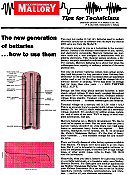 Mercury batteries used to be fairly common
in commercial and household applications. Mallory published this full-page promotion
for their line of mercury batteries in a 1962 issue of Radio-Electronics
magazine. Mercury batteries exhibit a very flat voltage vs. time discharge curve.
Mercury became a popular "public enemy" in the 1970s when medical research exposed
significant negative biological and physiological impacts on humans. I remember
in elementary school in the 1960s having the teacher pour mercury into our hands
to allow us to observe its properties. It "exploded" into hundreds of tiny pieces
when dropped on the floor ;-) Wall switches and thermostats in homes contained mercury
for making electrical contact. I still have a couple of them for nostalgic purposes.
My current oral thermometer has mercury in it (many today use colored alcohol... Mercury batteries used to be fairly common
in commercial and household applications. Mallory published this full-page promotion
for their line of mercury batteries in a 1962 issue of Radio-Electronics
magazine. Mercury batteries exhibit a very flat voltage vs. time discharge curve.
Mercury became a popular "public enemy" in the 1970s when medical research exposed
significant negative biological and physiological impacts on humans. I remember
in elementary school in the 1960s having the teacher pour mercury into our hands
to allow us to observe its properties. It "exploded" into hundreds of tiny pieces
when dropped on the floor ;-) Wall switches and thermostats in homes contained mercury
for making electrical contact. I still have a couple of them for nostalgic purposes.
My current oral thermometer has mercury in it (many today use colored alcohol...
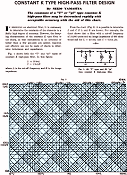 Constant K filters are not seen much in
modern designs, but were some of the earliest types of controlled impedance frequency
selective networks. George Campbell is credited with inventing constant K filters
in the early days of the last century. He referred to the circuits as "electric
wave filters." Campbell's filters consisted of identical cascaded sections of "T"
and "pi" inductor and capacitor combinations, yielding arbitrarily high (theoretically)
out-of-band cutoff and band edge steepness. Less than ideal quality factor of the
components causes realizable filters to exhibit increasing insertion loss and reduction
in band edge corner sharpness as sections are added. Within a couple decades as
improved filters became necessary, other transfer functions like the Butterworth... Constant K filters are not seen much in
modern designs, but were some of the earliest types of controlled impedance frequency
selective networks. George Campbell is credited with inventing constant K filters
in the early days of the last century. He referred to the circuits as "electric
wave filters." Campbell's filters consisted of identical cascaded sections of "T"
and "pi" inductor and capacitor combinations, yielding arbitrarily high (theoretically)
out-of-band cutoff and band edge steepness. Less than ideal quality factor of the
components causes realizable filters to exhibit increasing insertion loss and reduction
in band edge corner sharpness as sections are added. Within a couple decades as
improved filters became necessary, other transfer functions like the Butterworth...
 "The
ARRL Teachers Institute on Wireless Technology is growing next year, and a number
of social media stars are coming together to help it happen. On Saturday, November
30, a live fundraiser telethon is set to take place on the Ham Radio Crash Course
YouTube channel. Host Josh Nass, KI6NAZ, will be joined by several web-famous hams
to talk radio and raise money. The proceeds benefit the ARRL Education and Technology
Fund, which is what pays for the Teachers Institute (TI). There is skin in the game.
'Several donors created a challenge with a $20,000 pledge. The Donor Challenge will
be unlocked when others step up and give during this year's telethon" "The
ARRL Teachers Institute on Wireless Technology is growing next year, and a number
of social media stars are coming together to help it happen. On Saturday, November
30, a live fundraiser telethon is set to take place on the Ham Radio Crash Course
YouTube channel. Host Josh Nass, KI6NAZ, will be joined by several web-famous hams
to talk radio and raise money. The proceeds benefit the ARRL Education and Technology
Fund, which is what pays for the Teachers Institute (TI). There is skin in the game.
'Several donors created a challenge with a $20,000 pledge. The Donor Challenge will
be unlocked when others step up and give during this year's telethon"
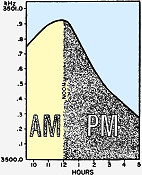 This is pretty cool. If I owned a good receiver
(which I don't), I would definitely give it a try. In 1970 when this Popular
Electronics magazine article was written, a lot of Hams were still using tube
receivers so the recommendation to let the equipment warm up for several hours prior
to making the fine frequency adjustments was good advice. Nowadays the warm-up time
and stability of receivers should permit 30 minutes or so to suffice (even ovenized
frequency references need time to stabilize when first powered up). Unless I missed
it, the author does not explicitly state that the
frequency change measured over time is due to gravity acting on the mass of
the crystal reference, but I suspect that is his intention since part of the experiment
involves disconnecting the antenna and shielding the receiver from outside interferers.
Over a lunar month period (29.5 days)... This is pretty cool. If I owned a good receiver
(which I don't), I would definitely give it a try. In 1970 when this Popular
Electronics magazine article was written, a lot of Hams were still using tube
receivers so the recommendation to let the equipment warm up for several hours prior
to making the fine frequency adjustments was good advice. Nowadays the warm-up time
and stability of receivers should permit 30 minutes or so to suffice (even ovenized
frequency references need time to stabilize when first powered up). Unless I missed
it, the author does not explicitly state that the
frequency change measured over time is due to gravity acting on the mass of
the crystal reference, but I suspect that is his intention since part of the experiment
involves disconnecting the antenna and shielding the receiver from outside interferers.
Over a lunar month period (29.5 days)...
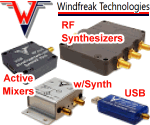 Windfreak Technologies designs, manufactures,
tests and sells high value USB powered and controlled radio frequency products such as
RF signal generators, RF synthesizers, RF power detectors, mixers, up / downconverters.
Since the conception of WFT, we have introduced products that have been purchased
by a wide range of customers, from hobbyists to education facilities to government
agencies. Worldwide customers include Europe, Australia, and Asia. Please contact
Windfreak today to learn how they might help you with your current project. Windfreak Technologies designs, manufactures,
tests and sells high value USB powered and controlled radio frequency products such as
RF signal generators, RF synthesizers, RF power detectors, mixers, up / downconverters.
Since the conception of WFT, we have introduced products that have been purchased
by a wide range of customers, from hobbyists to education facilities to government
agencies. Worldwide customers include Europe, Australia, and Asia. Please contact
Windfreak today to learn how they might help you with your current project.
Monday the 25th
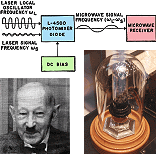 The August 1962 "News Briefs" column in
Radio-Electronics magazine contained a few notable events. Sigmund Loewe,
who was one of the first people to create
integrated circuits within a single vacuum tube (Loewe 3NF), passed away. The
3NF contained three triode assemblies, two capacitors and four resistors, configured
to enable a complete radio receiver in a single tube. It must have been expensive
because his company offered to repair failed internal components (for a fee, I suppose).
Ford Motors announced an experimental collision avoidance radar with a 500-foot
range for cars. The U.S. Congress, in its ever-expanding regulation manner,
decreed that all future TVs must be manufactured with a full 82-channel (VHF and
UHF)... The August 1962 "News Briefs" column in
Radio-Electronics magazine contained a few notable events. Sigmund Loewe,
who was one of the first people to create
integrated circuits within a single vacuum tube (Loewe 3NF), passed away. The
3NF contained three triode assemblies, two capacitors and four resistors, configured
to enable a complete radio receiver in a single tube. It must have been expensive
because his company offered to repair failed internal components (for a fee, I suppose).
Ford Motors announced an experimental collision avoidance radar with a 500-foot
range for cars. The U.S. Congress, in its ever-expanding regulation manner,
decreed that all future TVs must be manufactured with a full 82-channel (VHF and
UHF)...
 Werbel Microwave's Model
WM2PD-0.5-26.5-S is a wideband 2-way in-line power splitter covering of 2 to
26.5 GHz with excellent return loss, low insertion loss, and high isolation
performance. Insertion loss is only 0.6 dB typical above 3 dB split loss,
with high isolation of 20 dB typical. Amplitude balance is typically .07 dB,
while input and output return losses are typically 16 and 20 dB, respectively.
We are launching the new 26.5 GHz product line, this is one of several models
to be introduced. Designed, assembled, and tested in USA. Werbel Microwave's Model
WM2PD-0.5-26.5-S is a wideband 2-way in-line power splitter covering of 2 to
26.5 GHz with excellent return loss, low insertion loss, and high isolation
performance. Insertion loss is only 0.6 dB typical above 3 dB split loss,
with high isolation of 20 dB typical. Amplitude balance is typically .07 dB,
while input and output return losses are typically 16 and 20 dB, respectively.
We are launching the new 26.5 GHz product line, this is one of several models
to be introduced. Designed, assembled, and tested in USA.
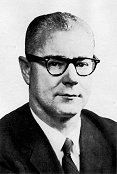 The term "tyranny
of numbers" arose in the mid-20th century to describe a critical challenge in
electronic computation, particularly during and after World War II. It highlighted
a paradox where the increasing complexity of electronic systems, primarily vacuum
tube computers, created a threshold beyond which the devices' failure rates and
downtime overshadowed their economic and practical benefits. The problem underscored
the limits of then-current technology and spurred innovation that ultimately transformed
computing. The phrase is widely attributed to Jack Morton, an influential engineer
and executive at Bell Telephone Laboratories. Morton used it to illustrate the growing
challenge of reliability in increasingly complex systems. While the exact date of
its first appearance in print is debated, it gained... The term "tyranny
of numbers" arose in the mid-20th century to describe a critical challenge in
electronic computation, particularly during and after World War II. It highlighted
a paradox where the increasing complexity of electronic systems, primarily vacuum
tube computers, created a threshold beyond which the devices' failure rates and
downtime overshadowed their economic and practical benefits. The problem underscored
the limits of then-current technology and spurred innovation that ultimately transformed
computing. The phrase is widely attributed to Jack Morton, an influential engineer
and executive at Bell Telephone Laboratories. Morton used it to illustrate the growing
challenge of reliability in increasingly complex systems. While the exact date of
its first appearance in print is debated, it gained...
 "New research by Loughborough University
warns that global renewable electricity supply will be unable to meet the surging
demand from digital data by 2025. In a new paper published in Energy Policy, Loughborough
Business School academics Dr. Vitor Castro and Professors Tom Jackson and Ian Hodgkinson
present econometric models showing the
world's current trajectory towards a "data doomsday." Their research also forecasts
that, based on current energy projections, global electricity supply will be unable
to meet the surging demand from digital data within the next decade. Startlingly,
if data consumption continues unabated, electricity demand driven by data could
exceed global electricity production by 2033. Digital data is generated by..." "New research by Loughborough University
warns that global renewable electricity supply will be unable to meet the surging
demand from digital data by 2025. In a new paper published in Energy Policy, Loughborough
Business School academics Dr. Vitor Castro and Professors Tom Jackson and Ian Hodgkinson
present econometric models showing the
world's current trajectory towards a "data doomsday." Their research also forecasts
that, based on current energy projections, global electricity supply will be unable
to meet the surging demand from digital data within the next decade. Startlingly,
if data consumption continues unabated, electricity demand driven by data could
exceed global electricity production by 2033. Digital data is generated by..."
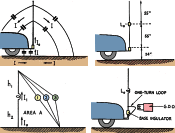 Here is a very in-depth and comprehensive
discussion on
antenna system design and evaluation for a mobile platform; i.e., a car or truck.
As was common with QST magazine articles of yore, there is a plethora of equations
(including, gasp, complex numbers), sketches, graphs, and tables provided for reference.
Radiation resistance, ground resistance, system impedance, antenna tuning, radiation
efficiency, current distributions, and much more are introduced and explained. Even
being seven decades old, the information is as valuable today as it was... Here is a very in-depth and comprehensive
discussion on
antenna system design and evaluation for a mobile platform; i.e., a car or truck.
As was common with QST magazine articles of yore, there is a plethora of equations
(including, gasp, complex numbers), sketches, graphs, and tables provided for reference.
Radiation resistance, ground resistance, system impedance, antenna tuning, radiation
efficiency, current distributions, and much more are introduced and explained. Even
being seven decades old, the information is as valuable today as it was...
 Windfreak Technologies designs, manufactures,
tests and sells high value USB powered and controlled radio frequency products such as
RF signal generators, RF synthesizers, RF power detectors, mixers, up / downconverters.
Since the conception of WFT, we have introduced products that have been purchased
by a wide range of customers, from hobbyists to education facilities to government
agencies. Worldwide customers include Europe, Australia, and Asia. Please contact
Windfreak today to learn how they might help you with your current project. Windfreak Technologies designs, manufactures,
tests and sells high value USB powered and controlled radio frequency products such as
RF signal generators, RF synthesizers, RF power detectors, mixers, up / downconverters.
Since the conception of WFT, we have introduced products that have been purchased
by a wide range of customers, from hobbyists to education facilities to government
agencies. Worldwide customers include Europe, Australia, and Asia. Please contact
Windfreak today to learn how they might help you with your current project.
Friday the 22nd
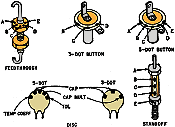 If you have ever had the occasion to service
a piece of vintage electronic equipment, then you have surely encountered instances
of capacitors, inductors, resistors, and transformers with
color and/or numeric markings for identification. A lot of today's components
are clearly marked with laser etching or indelible ink (some of it so small as to
be barely legible), but even so, deciphering a component's value can be challenging
or even impossible. Given that most products today are considered disposable or
at least non-serviceable, component marking wouldn't be needed at all except for
during automated assembly and inspection where... If you have ever had the occasion to service
a piece of vintage electronic equipment, then you have surely encountered instances
of capacitors, inductors, resistors, and transformers with
color and/or numeric markings for identification. A lot of today's components
are clearly marked with laser etching or indelible ink (some of it so small as to
be barely legible), but even so, deciphering a component's value can be challenging
or even impossible. Given that most products today are considered disposable or
at least non-serviceable, component marking wouldn't be needed at all except for
during automated assembly and inspection where...
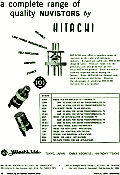 According to the somewhat limited unique
information available about the "nuvistor"
vacuum tube amplifier, it was superior to many glass-encapsulated vacuum tubes.
Lower noise figure, smaller size, greater ruggedness, intrinsically shielded, and
relatively higher operating frequency (near a gigahertz) were the main marketing
standpoint. RCA introduced the nuvistor in 1959, and shortly thereafter General
Electric (GE), started making them, and then by 1964 (maybe earlier) Hitachi was
offering nuvistors. The manufacturing process, where the entire assembly was performed
in a vacuum chamber, made nuvistors more expensive than competitor glass tubes.
The nuvistor concept might have been big if semiconductors (transistors) had not
been making such rapid progress in supplanting... According to the somewhat limited unique
information available about the "nuvistor"
vacuum tube amplifier, it was superior to many glass-encapsulated vacuum tubes.
Lower noise figure, smaller size, greater ruggedness, intrinsically shielded, and
relatively higher operating frequency (near a gigahertz) were the main marketing
standpoint. RCA introduced the nuvistor in 1959, and shortly thereafter General
Electric (GE), started making them, and then by 1964 (maybe earlier) Hitachi was
offering nuvistors. The manufacturing process, where the entire assembly was performed
in a vacuum chamber, made nuvistors more expensive than competitor glass tubes.
The nuvistor concept might have been big if semiconductors (transistors) had not
been making such rapid progress in supplanting...
 "Attackers in conflicts worldwide are
jamming and spoofing GPS signals, making it more difficult for aircraft to navigate
and putting them at risk of entering into hostile airspace. Attackers saturate GPS
receivers in satellites, planes and other devices to make them unusable, Todd Humphreys,
professor of engineering in the aerospace department at the University of Texas
in Austin said in a keynote at the recent Brooklyn 6G Summit. These attacks have
increased in recent years and will continue into the 6G era. This electronic warfare
has recently spilled over from war regions into the civilian sector, Humphreys said.
Jamming has..." "Attackers in conflicts worldwide are
jamming and spoofing GPS signals, making it more difficult for aircraft to navigate
and putting them at risk of entering into hostile airspace. Attackers saturate GPS
receivers in satellites, planes and other devices to make them unusable, Todd Humphreys,
professor of engineering in the aerospace department at the University of Texas
in Austin said in a keynote at the recent Brooklyn 6G Summit. These attacks have
increased in recent years and will continue into the 6G era. This electronic warfare
has recently spilled over from war regions into the civilian sector, Humphreys said.
Jamming has..."
•
RF Front-End Tech Driving Growth in Automotive Industry
• Wi-Fi Goes Long Range
on New WiLo Standard
•
IBM Closes China R&D Operations
• Global
Smartphone Shipments Rise in Q3
• FCC Rules for
Drone Ops in 5 GHz Band
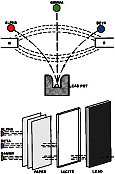 This is an instance where I scanned and
posted later parts of a multi-month Popular Electronics magazine article
because I had not yet purchased the edition with the first in the series, but I
have it now. Author J.G. Ello, of the
Radiation Measurements and Instrumentation Electronics Division of Argonne National
Laboratory, introduces the physics of nuclear radiation along with the genesis and
evolution of nuclear technology. Alpha, beta, and gamma radiation is explained,
as is the decay phenomenon and energy levels. It is all at an introductory level,
and from a classical Bohr model perspective. If you are new to nuclear physics,
these four articles are a good starting place. Parts 1, 2, and 3 of this series
appeared in the October, November and December 1972 issues... This is an instance where I scanned and
posted later parts of a multi-month Popular Electronics magazine article
because I had not yet purchased the edition with the first in the series, but I
have it now. Author J.G. Ello, of the
Radiation Measurements and Instrumentation Electronics Division of Argonne National
Laboratory, introduces the physics of nuclear radiation along with the genesis and
evolution of nuclear technology. Alpha, beta, and gamma radiation is explained,
as is the decay phenomenon and energy levels. It is all at an introductory level,
and from a classical Bohr model perspective. If you are new to nuclear physics,
these four articles are a good starting place. Parts 1, 2, and 3 of this series
appeared in the October, November and December 1972 issues...
Thursday the 21st
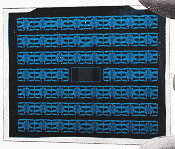 Just half a decade before this "Microelectronics:
The Thin Film Approach" article appeared in Radio-Electronics magazine, Jack
Kilby of Texas Instruments and Robert Noyce of Fairchild Semiconductor had independently
announced their creations of the world's first (and second, but we can't say which
is which) monolithic semiconductor integrated circuit. Specifying "monolithic" is
important because other forms of integrated circuits had been marketed before then
- both passive and active, and both vacuum tube and semiconductor. Monolithic means
all the discrete components were fabricated directly on and within a single semiconductor
substrate. This thin film approach... Just half a decade before this "Microelectronics:
The Thin Film Approach" article appeared in Radio-Electronics magazine, Jack
Kilby of Texas Instruments and Robert Noyce of Fairchild Semiconductor had independently
announced their creations of the world's first (and second, but we can't say which
is which) monolithic semiconductor integrated circuit. Specifying "monolithic" is
important because other forms of integrated circuits had been marketed before then
- both passive and active, and both vacuum tube and semiconductor. Monolithic means
all the discrete components were fabricated directly on and within a single semiconductor
substrate. This thin film approach...
 It
seems you can't drive more than a few miles without seeing huge colored spools sitting
at the side of the road. Most of them are orange, although red sometimes accompanies
them. It turns out they are not rolls of cable, but are high-density polyethylene
(HDPE) pipe
designed to be buried in the ground and used as conduit for various types of cable.
According to the American Public Works Association (APWA)
Uniform
Color Code, orange is assigned to communications and alarm cables, red is for
electrical cables, yellow is fuel gas, green is sewage, blue is potable (drinkable)
water, and violet is reclaimed water. Color marking can be solid or a stripe along
the length. Now you know, if you didn't before. You're welcome. It
seems you can't drive more than a few miles without seeing huge colored spools sitting
at the side of the road. Most of them are orange, although red sometimes accompanies
them. It turns out they are not rolls of cable, but are high-density polyethylene
(HDPE) pipe
designed to be buried in the ground and used as conduit for various types of cable.
According to the American Public Works Association (APWA)
Uniform
Color Code, orange is assigned to communications and alarm cables, red is for
electrical cables, yellow is fuel gas, green is sewage, blue is potable (drinkable)
water, and violet is reclaimed water. Color marking can be solid or a stripe along
the length. Now you know, if you didn't before. You're welcome.
 Ernest Rutherford, one of the most distinguished
figures in the history of physics, was born on August 30, 1871, in Brightwater,
a small rural community near Nelson, New Zealand. He was the fourth of twelve children
in a large and industrious family. His father, James Rutherford, was a Scottish
emigrant and a skilled wheelwright and farmer, while his mother, Martha Thompson
Rutherford, was an English schoolteacher dedicated to instilling a love of learning
in her children. The Rutherfords valued education deeply, a sentiment that greatly
influenced Ernest's intellectual development. Rutherford attended Havelock School,
where his exceptional abilities became apparent. He won a scholarship to attend
Nelson College, where he further excelled academically, particularly in mathematics... Ernest Rutherford, one of the most distinguished
figures in the history of physics, was born on August 30, 1871, in Brightwater,
a small rural community near Nelson, New Zealand. He was the fourth of twelve children
in a large and industrious family. His father, James Rutherford, was a Scottish
emigrant and a skilled wheelwright and farmer, while his mother, Martha Thompson
Rutherford, was an English schoolteacher dedicated to instilling a love of learning
in her children. The Rutherfords valued education deeply, a sentiment that greatly
influenced Ernest's intellectual development. Rutherford attended Havelock School,
where his exceptional abilities became apparent. He won a scholarship to attend
Nelson College, where he further excelled academically, particularly in mathematics...
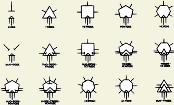 There is something about these proposed
shorthand circuit symbols that reminds me of the IEEE digital logic symbols
using the distinctive shape (the traditional format) versus the newer rectangular
shape format. The set is quite extensive when all the different flavors of combinatorial
blocks - flip-flops, timers, counters, shift registers, encoders, decoders, etc.
- are included. My personal preference, you might guess, is the original format
with distinctive shapes. Although I do not do a lot of digital work, it is easier
for me to follow the signal flow and mentally perform the logic operations with
the distinctive shapes... There is something about these proposed
shorthand circuit symbols that reminds me of the IEEE digital logic symbols
using the distinctive shape (the traditional format) versus the newer rectangular
shape format. The set is quite extensive when all the different flavors of combinatorial
blocks - flip-flops, timers, counters, shift registers, encoders, decoders, etc.
- are included. My personal preference, you might guess, is the original format
with distinctive shapes. Although I do not do a lot of digital work, it is easier
for me to follow the signal flow and mentally perform the logic operations with
the distinctive shapes...
 Anritsu has been a global provider of innovative
communications test and measurement solutions for more than 120 years. Anritsu manufactures
a full line of innovative components and accessories for
RF and Microwave Test and Measurement
Equipment including attenuators & terminations; coaxial cables, connectors &
adapters; o-scopes; power meters & sensors; signal generators; antenna, signal,
spectrum, & vector network analyzers (VNAs); calibration kits; Bluetooth &
WLAN testers; PIM testers; amplifiers; power dividers; antennas. "We've Got You
Covered." Anritsu has been a global provider of innovative
communications test and measurement solutions for more than 120 years. Anritsu manufactures
a full line of innovative components and accessories for
RF and Microwave Test and Measurement
Equipment including attenuators & terminations; coaxial cables, connectors &
adapters; o-scopes; power meters & sensors; signal generators; antenna, signal,
spectrum, & vector network analyzers (VNAs); calibration kits; Bluetooth &
WLAN testers; PIM testers; amplifiers; power dividers; antennas. "We've Got You
Covered."
Wednesday the 20th
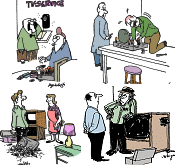 I have written before about the love-hate
relationship a lot of the buying public had with television and radio repair shops
and repairmen - similar to car owners and mechanics. Lots of jokes and skits (what
today is termed a "meme") were created back in the heyday of in-home entertainment
to make light of the situation. These four
electronics-themed comics from a 1962 issue of Radio-Electronics magazine
are typical examples. The one from page 111 alludes to an issue that would
almost never be seen today on a TV, unless maybe the AC power supply was on the
fritz. A composite analog broadcast signal contained vertical and horizontal sync[ronization]
components which... I have written before about the love-hate
relationship a lot of the buying public had with television and radio repair shops
and repairmen - similar to car owners and mechanics. Lots of jokes and skits (what
today is termed a "meme") were created back in the heyday of in-home entertainment
to make light of the situation. These four
electronics-themed comics from a 1962 issue of Radio-Electronics magazine
are typical examples. The one from page 111 alludes to an issue that would
almost never be seen today on a TV, unless maybe the AC power supply was on the
fritz. A composite analog broadcast signal contained vertical and horizontal sync[ronization]
components which...
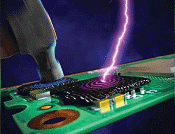 "Electrostatic
discharge (ESD) protection is a significant concern in the chemical and electronics
industries. In electronics, ESD often causes integrated circuit failures due to
rapid voltage and current discharges from charged objects, such as human fingers
or tools. With the help of 3D printing techniques, researchers at Lawrence Livermore
National Laboratory (LLNL) are 'packaging' electronics with printable elastomeric
silicone foams to provide both mechanical and electrical protection of sensitive
components. Without suitable protection, substantial equipment and component..." "Electrostatic
discharge (ESD) protection is a significant concern in the chemical and electronics
industries. In electronics, ESD often causes integrated circuit failures due to
rapid voltage and current discharges from charged objects, such as human fingers
or tools. With the help of 3D printing techniques, researchers at Lawrence Livermore
National Laboratory (LLNL) are 'packaging' electronics with printable elastomeric
silicone foams to provide both mechanical and electrical protection of sensitive
components. Without suitable protection, substantial equipment and component..."
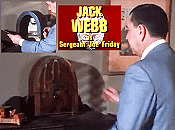 Mr. Bob Davis, a seemingly endless
source of little known and/or long forgotten
historical
radio and television technical trivia, apprised me of this short segment from
the 1960s Dragnet television series, starring Sgt. Joe Friday. It features a guy,
who turns out to be a ... well, I won't spoil it for you ... who proudly professes
his thirty year career as a radio repairman. "...started back in the days of the
old Crosleys, Atwater-Kents, Farnsworths. Those were real radios, well built, well
designed. Nothing cheap about any of them. They didn't have transistors in those
days, just tubes as big as light bulbs. That meant heavy chassis, heavy transformers,
and we didn't fix them by simply slapping in a new part, either. We fixed the old
parts. I wish... Mr. Bob Davis, a seemingly endless
source of little known and/or long forgotten
historical
radio and television technical trivia, apprised me of this short segment from
the 1960s Dragnet television series, starring Sgt. Joe Friday. It features a guy,
who turns out to be a ... well, I won't spoil it for you ... who proudly professes
his thirty year career as a radio repairman. "...started back in the days of the
old Crosleys, Atwater-Kents, Farnsworths. Those were real radios, well built, well
designed. Nothing cheap about any of them. They didn't have transistors in those
days, just tubes as big as light bulbs. That meant heavy chassis, heavy transformers,
and we didn't fix them by simply slapping in a new part, either. We fixed the old
parts. I wish...
 A new word has been added to my personal
lexicon: "sphenoidal."
Author John Kraus used it to describe the wedge shape of a
corner reflector. The Oxford Dictionary defines "sphenoid" thusly: "A compound
bone that forms the base of the cranium, behind the eye and below the front part
of the brain. It has two pairs of broad lateral "wings" and a number of other projections,
and contains two air-filled sinuses." This "square corner" configuration - essentially
a "V" shape, is shown to exhibit up to 10 dB of gain while being relatively (compared
to a parabolic reflector) insensitive... A new word has been added to my personal
lexicon: "sphenoidal."
Author John Kraus used it to describe the wedge shape of a
corner reflector. The Oxford Dictionary defines "sphenoid" thusly: "A compound
bone that forms the base of the cranium, behind the eye and below the front part
of the brain. It has two pairs of broad lateral "wings" and a number of other projections,
and contains two air-filled sinuses." This "square corner" configuration - essentially
a "V" shape, is shown to exhibit up to 10 dB of gain while being relatively (compared
to a parabolic reflector) insensitive...
Tuesday the 19th
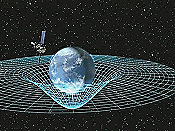 Albert Einstein's general theory of relativity,
published in 1915, fundamentally reshaped the way scientists understand gravity,
space, and time. It extended his 1905 special theory of relativity, which described
how the laws of physics are consistent for all observers in uniform motion and how
light's speed is constant in a vacuum. However, the special theory did not address
accelerating reference frames or gravitational forces. Einstein's general theory
tackled these limitations by proposing that gravity is not a force in the traditional
sense, but rather a curvature of spacetime caused by mass and energy. This profound
insight would alter the course of 20th-century physics, influencing cosmology, black
hole theory... Albert Einstein's general theory of relativity,
published in 1915, fundamentally reshaped the way scientists understand gravity,
space, and time. It extended his 1905 special theory of relativity, which described
how the laws of physics are consistent for all observers in uniform motion and how
light's speed is constant in a vacuum. However, the special theory did not address
accelerating reference frames or gravitational forces. Einstein's general theory
tackled these limitations by proposing that gravity is not a force in the traditional
sense, but rather a curvature of spacetime caused by mass and energy. This profound
insight would alter the course of 20th-century physics, influencing cosmology, black
hole theory...
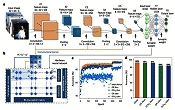 "The growing use of artificial intelligence
(AI)-based models is placing greater demands on the electronics industry, as many
of these models require significant storage space and computational power. Engineers
worldwide have thus been trying to develop neuromorphic computing systems that could
help meet these demands, many of which are based on memristors.
Memristors are electronic components that regulate the flow of electrical current
in circuits while also 'remembering' the amount of electrical charge that previously
passed through them. These components could replicate the function of biological..." "The growing use of artificial intelligence
(AI)-based models is placing greater demands on the electronics industry, as many
of these models require significant storage space and computational power. Engineers
worldwide have thus been trying to develop neuromorphic computing systems that could
help meet these demands, many of which are based on memristors.
Memristors are electronic components that regulate the flow of electrical current
in circuits while also 'remembering' the amount of electrical charge that previously
passed through them. These components could replicate the function of biological..."
 Reading through the news items in the vintage
electronics magazines provides a mixture of important historical facts and figures
along with some predictions on the future of the industry. Some of the predictions
turn out to be amazingly accurate, even though in retrospect they might seem obvious.
Take, for example, Sylvania VP Dr. Robert Castor's foresight about how, "the future
growth of the semiconductor industry lies in a major switch from the production
of individual components to solid-state subsystems that can be used as building
blocks in electronic designs." "Well of course," you might be temped to say; however,
at the time there were still significant hurdles to overcome related to material
purity, wafer size, photolithography... Reading through the news items in the vintage
electronics magazines provides a mixture of important historical facts and figures
along with some predictions on the future of the industry. Some of the predictions
turn out to be amazingly accurate, even though in retrospect they might seem obvious.
Take, for example, Sylvania VP Dr. Robert Castor's foresight about how, "the future
growth of the semiconductor industry lies in a major switch from the production
of individual components to solid-state subsystems that can be used as building
blocks in electronic designs." "Well of course," you might be temped to say; however,
at the time there were still significant hurdles to overcome related to material
purity, wafer size, photolithography...
 Reactel has become one of the industry leaders
in the design and manufacture of RF and microwave filters, diplexers, and sub-assemblies. They
offer the generally known tubular, LC, cavity, and waveguide designs, as well as
state of the art high performance suspended substrate models. Through a continuous
process of research and development, they have established a full line of filters
of filters of all types - lowpass, highpass, bandpass, bandstop, diplexer, and more.
Established in 1979. Please contact Reactel today to see how they might help your
project. Reactel has become one of the industry leaders
in the design and manufacture of RF and microwave filters, diplexers, and sub-assemblies. They
offer the generally known tubular, LC, cavity, and waveguide designs, as well as
state of the art high performance suspended substrate models. Through a continuous
process of research and development, they have established a full line of filters
of filters of all types - lowpass, highpass, bandpass, bandstop, diplexer, and more.
Established in 1979. Please contact Reactel today to see how they might help your
project.
Monday the 18th
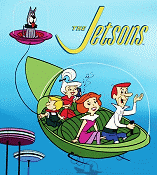 2012 came and went more than a decade ago.
The date was 50 years in the future back in 1962 when Radio-Electronics
magazine editor Hugo Gernsback asked industry leaders to cogitate on possibilities
of the
state of electronics in 2012. Let's see how they did. One guy predicted our
communications would be in the 100 THz to 1,500 THz band, using 2 decimeter
antennas. Nope. Another believed we would be communicating with aliens on a regular
basis. A military dude partly hit the mark by predicting 2- and 3-year-olds would
be sitting in front of "televideo screens" (cellphones) learning Esperanto and "other
basic studies." Bell Labs believed most audiovisual material, along with commerce,
would be done electronically; i.e., the World Wide Web. I'm not quite sure how to
interpret the IT&T guy's prediction of replacing microwave space transmission
with light wavelength waveguide transmission. Seems bassackward to me... 2012 came and went more than a decade ago.
The date was 50 years in the future back in 1962 when Radio-Electronics
magazine editor Hugo Gernsback asked industry leaders to cogitate on possibilities
of the
state of electronics in 2012. Let's see how they did. One guy predicted our
communications would be in the 100 THz to 1,500 THz band, using 2 decimeter
antennas. Nope. Another believed we would be communicating with aliens on a regular
basis. A military dude partly hit the mark by predicting 2- and 3-year-olds would
be sitting in front of "televideo screens" (cellphones) learning Esperanto and "other
basic studies." Bell Labs believed most audiovisual material, along with commerce,
would be done electronically; i.e., the World Wide Web. I'm not quite sure how to
interpret the IT&T guy's prediction of replacing microwave space transmission
with light wavelength waveguide transmission. Seems bassackward to me...
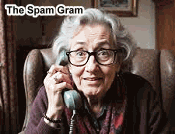 Here is a unique approach to discouraging scam
callers. A lot of scam calls are themselves AI, so can one AI detect and aviod another?
"Gangster
Granny! Meet Daisy: O2's new weapon against scammers. O2 has unveiled its new,
unique weapon in its fight against scammers: Daisy, an AI-powered assistant designed
to keep fraudsters talking and waste their time. As part of Virgin Media O2's 'Swerve
the Scammers' campaign, Daisy's mission is to distract scammers with realistic,
rambling conversations, helping protect potential victims while raising awareness
about fraud. Her lifelike conversations, peppered with stories about family or hobbies
like knitting, have kept fraudsters on the line for up to 40 minutes..." Here is a unique approach to discouraging scam
callers. A lot of scam calls are themselves AI, so can one AI detect and aviod another?
"Gangster
Granny! Meet Daisy: O2's new weapon against scammers. O2 has unveiled its new,
unique weapon in its fight against scammers: Daisy, an AI-powered assistant designed
to keep fraudsters talking and waste their time. As part of Virgin Media O2's 'Swerve
the Scammers' campaign, Daisy's mission is to distract scammers with realistic,
rambling conversations, helping protect potential victims while raising awareness
about fraud. Her lifelike conversations, peppered with stories about family or hobbies
like knitting, have kept fraudsters on the line for up to 40 minutes..."
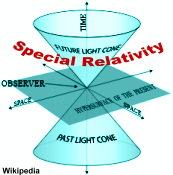
Albert Einstein's
special theory of relativity, a milestone in physics, transformed our understanding
of space, time, and energy (mass). The theory, published in 1905, stemmed from Einstein's
efforts to resolve inconsistencies in classical physics, specifically between Newtonian
mechanics and electromagnetism as formulated by James Clerk Maxwell. By reconceiving
space and time as interconnected and relative to the observer's frame of reference,
Einstein established a framework that had profound implications for science and
technology. To understand how this groundbreaking idea emerged, one must consider...
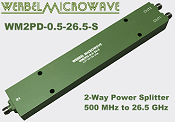 Werbel Microwave's Model WM2PD-0.5-26.5-S
is a wideband 2-way in-line power splitter covering of 500 MHz to 26.5 GHz with
excellent return loss, low insertion loss, and high isolation performance. With
ultrawideband performance, amplitude balance is typically 0.24 dB and phase
unbalance is typically 2.6°. Insertion loss is low for the bandwidth, coming in
at a typical 1.2 dB above 3 dB splitting loss. Return loss 16 dB
typical. Isolation 18 dB typical. The device is precision-assembled and tested
in the USA... Werbel Microwave's Model WM2PD-0.5-26.5-S
is a wideband 2-way in-line power splitter covering of 500 MHz to 26.5 GHz with
excellent return loss, low insertion loss, and high isolation performance. With
ultrawideband performance, amplitude balance is typically 0.24 dB and phase
unbalance is typically 2.6°. Insertion loss is low for the bandwidth, coming in
at a typical 1.2 dB above 3 dB splitting loss. Return loss 16 dB
typical. Isolation 18 dB typical. The device is precision-assembled and tested
in the USA...
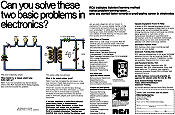 If you wanted a career as an
electronics technician at the end of World War II, the world was your oyster
- so to speak. Electronics and communications trade magazines and publications like
Mechanix Illustrated and Popular Science ran a plethora of ads
monthly that offered unlimited opportunity to men seeking a career servicing the
burgeoning market of postwar technological marvels. Even though the enclosures were
not yet being marked with "No user serviceable parts inside," that fact was most
people were not qualified - nor did they want - to monkey with the guts of radios,
televisions, and other household appliances... (I provide a simulation to show the
true zener diode circuit output)... If you wanted a career as an
electronics technician at the end of World War II, the world was your oyster
- so to speak. Electronics and communications trade magazines and publications like
Mechanix Illustrated and Popular Science ran a plethora of ads
monthly that offered unlimited opportunity to men seeking a career servicing the
burgeoning market of postwar technological marvels. Even though the enclosures were
not yet being marked with "No user serviceable parts inside," that fact was most
people were not qualified - nor did they want - to monkey with the guts of radios,
televisions, and other household appliances... (I provide a simulation to show the
true zener diode circuit output)...
Friday the 15th
 Take time out of your busy workday to look
at these three
electronics-themed comics from the February 1962 issue of Radio-Electronics..
The page 32 comic reminds me of sometime in the late 1970s while working as
an electrician (prior to enlisting in the USAF) when I was doing side jobs, and
a guy had me wire up a receptacle for his big 25" screen (CRT) which he had mounted
in a wall, with the chassis sticking out the back. It was in an upstairs room in
a Cape Cod style house with lots of room behind the wall. He was a "man cave" pioneer
with a full suite of high quality audiovisual equipment - even a Betamax machine!
The page 81 comic exhibits the irony that would have existed in the day if
American-made electronics equipment had been promoted in Japan, which they probably
were not. In 1962, Japanese... Take time out of your busy workday to look
at these three
electronics-themed comics from the February 1962 issue of Radio-Electronics..
The page 32 comic reminds me of sometime in the late 1970s while working as
an electrician (prior to enlisting in the USAF) when I was doing side jobs, and
a guy had me wire up a receptacle for his big 25" screen (CRT) which he had mounted
in a wall, with the chassis sticking out the back. It was in an upstairs room in
a Cape Cod style house with lots of room behind the wall. He was a "man cave" pioneer
with a full suite of high quality audiovisual equipment - even a Betamax machine!
The page 81 comic exhibits the irony that would have existed in the day if
American-made electronics equipment had been promoted in Japan, which they probably
were not. In 1962, Japanese...
 Admittedly, I mostly posted this because
of the drawing. "While
direct-to-cell (D2C) satellite communications were a big topic at the recent
Brooklyn 6G Summit, the technology is already here, well before 6G's anticipated
2030 arrival. Apple and Google already offer D2C emergency messaging, and Starlink,
T-Mobile and others are anticipated to follow. D2C satellite communications will
be well established when 6G arrives. The 3GPP froze a 5G specification for Non-Terrestrial
Networks (NTN) in Release 17 in March 2022, which means that NTN-compatible chips
and components should be available now or soon. SpaceX has reduced the cost..." Admittedly, I mostly posted this because
of the drawing. "While
direct-to-cell (D2C) satellite communications were a big topic at the recent
Brooklyn 6G Summit, the technology is already here, well before 6G's anticipated
2030 arrival. Apple and Google already offer D2C emergency messaging, and Starlink,
T-Mobile and others are anticipated to follow. D2C satellite communications will
be well established when 6G arrives. The 3GPP froze a 5G specification for Non-Terrestrial
Networks (NTN) in Release 17 in March 2022, which means that NTN-compatible chips
and components should be available now or soon. SpaceX has reduced the cost..."
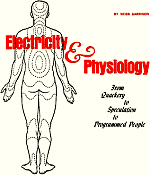 The subtitle of this article from a 1971
issue of Popular Electronics magazine, "From
Quackery to Speculation to Programmed People," could to some extent still be
applicable even though the author evidently meant to put an end to the "quackery"
and "speculation" part of it. Indeed, a lot of advancement has been made in the
fields of electrostimulation of weak or/or paralyzed muscles, healing of certain
types of soft and hard tissues, suppressing sporadic muscle twitching and epileptic
seizures, and other malady diagnosis and relief. Specifically tuned microwave frequencies
have proven useful in healing and symptom relief as well. As with most articles
on medical procedures, I cringe at some... The subtitle of this article from a 1971
issue of Popular Electronics magazine, "From
Quackery to Speculation to Programmed People," could to some extent still be
applicable even though the author evidently meant to put an end to the "quackery"
and "speculation" part of it. Indeed, a lot of advancement has been made in the
fields of electrostimulation of weak or/or paralyzed muscles, healing of certain
types of soft and hard tissues, suppressing sporadic muscle twitching and epileptic
seizures, and other malady diagnosis and relief. Specifically tuned microwave frequencies
have proven useful in healing and symptom relief as well. As with most articles
on medical procedures, I cringe at some...
Anatech Intros 3
Filter Models for November
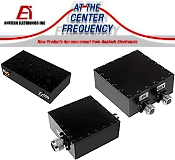 Anatech Electronics offers the industry's
largest portfolio of high-performance standard and customized RF and microwave filters
and filter-related products for military, commercial, aerospace and defense, and
industrial applications up to 40 GHz. Three new
C-band cavity bandpass filter models have been added to the product line, including
a 4994 MHz BPF with a 50 MHz bandwidth, a 4950 MHz BPF with a 10 MHz
bandwidth, and a 5785 MHz BPF with a 100 MHz bandwidth. Custom RF power
filter and directional couplers designs can be designed and produced with required
connector types when a standard cannot be found, or the requirements are such that
a custom... Anatech Electronics offers the industry's
largest portfolio of high-performance standard and customized RF and microwave filters
and filter-related products for military, commercial, aerospace and defense, and
industrial applications up to 40 GHz. Three new
C-band cavity bandpass filter models have been added to the product line, including
a 4994 MHz BPF with a 50 MHz bandwidth, a 4950 MHz BPF with a 10 MHz
bandwidth, and a 5785 MHz BPF with a 100 MHz bandwidth. Custom RF power
filter and directional couplers designs can be designed and produced with required
connector types when a standard cannot be found, or the requirements are such that
a custom...
• 5G
Is 42% of Fixed Wireless Access (FWA) in 2024
• Robert Dennard,
DRAM Pioneer, Dies at 91
• TSMC's Energy
Demand Drives Taiwan's Geopolitical Future
• Semiconductor
Packaging Market on 5.6% CAGR 'Till 2028
• Altering
Asteroid Trajectories with Nuclear X-Rays
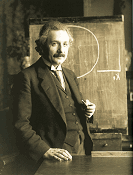 Albert Einstein, one of the most renowned
physicists in history, was born on March 14, 1879, in Ulm, in the Kingdom of Württemberg,
part of the German Empire. His father, Hermann Einstein, was an engineer and salesman
who ran an electrochemical factory, and his mother, Pauline Koch, managed the household
and supported her son's education. Einstein had one sister, Maja, who was born in
1881 and with whom he had a lifelong close relationship. Einstein's extended family
included several relatives who would play various roles in his life, both personally
and professionally. His early family life was comfortable, though his parents moved
frequently as they sought economic stability. Hermann Einstein's business ventures
had varying success, and eventually, the family moved to Italy in 1894... Albert Einstein, one of the most renowned
physicists in history, was born on March 14, 1879, in Ulm, in the Kingdom of Württemberg,
part of the German Empire. His father, Hermann Einstein, was an engineer and salesman
who ran an electrochemical factory, and his mother, Pauline Koch, managed the household
and supported her son's education. Einstein had one sister, Maja, who was born in
1881 and with whom he had a lifelong close relationship. Einstein's extended family
included several relatives who would play various roles in his life, both personally
and professionally. His early family life was comfortable, though his parents moved
frequently as they sought economic stability. Hermann Einstein's business ventures
had varying success, and eventually, the family moved to Italy in 1894...
These archive pages are provided in order to make it easier for you to find items
that you remember seeing on the RF Cafe homepage. Of course probably the easiest
way to find anything on the website is to use the "Search
RF Cafe" box at the top of every page. Some quoted items have been shortened
to save space. About RF Cafe.
Homepage Archive Pages
2026:
Jan |
Feb | Mar | Apr | May | Jun | Jul | Aug
| Sep | Oct | Nov | Dec
2025:
Jan |
Feb |
Mar |
Apr |
May |
Jun |
Jul |
Aug |
Sep |
Oct |
Nov |
Dec
2024:
Jan |
Feb |
Mar |
Apr |
May |
Jun |
Jul |
Aug |
Sep |
Oct |
Nov |
Dec
2023:
Jan |
Feb |
Mar |
Apr |
May |
Jun |
Jul |
Aug |
Sep |
Oct |
Nov |
Dec
2022:
Jan |
Feb |
Mar |
Apr |
May |
Jun |
Jul |
Aug |
Sep |
Oct |
Nov |
Dec
2021:
Jan |
Feb |
Mar |
Apr |
May |
Jun |
Jul |
Aug |
Sep |
Oct |
Nov |
Dec
2020:
Jan |
Feb |
Mar |
Apr |
May |
Jun |
Jul |
Aug |
Sep |
Oct |
Nov |
Dec
2019:
Jan |
Feb |
Mar |
Apr |
May |
Jun |
Jul |
Aug |
Sep |
Oct |
Nov |
Dec
2018:
Jan |
Feb |
Mar |
Apr |
May |
Jun |
Jul |
Aug |
Sep |
Oct |
Nov |
Dec
2017:
Jan | Feb |
Mar |
Apr |
May |
Jun |
Jul |
Aug |
Sep |
Oct |
Nov |
Dec
2016:
Jan | Feb |
Mar |
Apr |
May |
Jun |
Jul |
Aug |
Sep |
Oct |
Nov |
Dec
2015:
Jan | Feb |
Mar |
Apr |
May |
Jun |
Jul |
Aug | Sep |
Oct |
Nov |
Dec
2014:
Jan | Feb |
Mar |
Apr |
May |
Jun |
Jul |
Aug |
Sep |
Oct |
Nov |
Dec
2013:
Jan | Feb |
Mar |
Apr |
May |
Jun |
Jul |
Aug |
Sep |
Oct |
Nov |
Dec
2012: 1 |
2 | 3
| 4 | 5
| 6 | 7
| 8 | 9
| 10 | 11
| 12 | 13
(no archives before 2012)
- Christmas-themed
items
|




 Mr. Hugo Gernsback
Mr. Hugo Gernsback



 Exodus Advanced Communications
Exodus Advanced Communications









 Mercury batteries
Mercury batteries Constant K filters
Constant K filters













 Ernest Rutherford
Ernest Rutherford





 Albert Einstein's
Albert Einstein's



 Here is a unique approach to discouraging scam
callers. A lot of scam calls are themselves AI, so can one AI detect and aviod another?
"
Here is a unique approach to discouraging scam
callers. A lot of scam calls are themselves AI, so can one AI detect and aviod another?
"






 Albert Einstein
Albert Einstein


